*NURSING > EXAM REVIEW > Chapter 07: The Nursing Process and Standards of Care Halter: Varcarolis’ Foundations of Psychiatr (All)
Chapter 07: The Nursing Process and Standards of Care Halter: Varcarolis’ Foundations of Psychiatric Mental Health Nursing: A Clinical Approach, 8th Edition(All complete Responses)
Document Content and Description Below
1. A new staff nurse completes an orientation to the psychiatric unit. This nurse will expect to ask an advanced practice nurse to perform which action for patients? a. Perform mental health assessm... ent interviews. b. Prescribe psychotropic medication. c. Establish therapeutic relationships. d. Individualize nursing care plans. ANS: B Prescriptive privileges are granted to master‘s-prepared nurse practitioners who have taken special courses on prescribing medication. The nurse prepared at the basic level performs mental health assessments, establishes relationships, and provides individualized care planning. PTS: 1 DIF: Cognitive Level: Understand (Comprehension) REF: Pages 7-23, 24 TOP: Nursing Process: Implementation MSC: Client Needs: Safe, Effective Care Environment 87 2. A newly admitted patient diagnosed with major depressive disorder has gained 20 pounds over a few months and has suicidal ideation. The patient has taken antidepressant medication for 1 week without remission of symptoms. Select the priority nursing diagnosis. a. Imbalanced nutrition: more than body requirements b. Chronic low self-esteem c. Risk for suicide d. Hopelessness ANS: C Risk for suicide is the priority diagnosis when the patient has both suicidal ideation and a plan to carry out the suicidal intent. Imbalanced nutrition, hopelessness, and chronic low self-esteem may be applicable nursing diagnoses, but these problems do not affect patient safety as urgently as would a suicide attempt. PTS: 1 DIF: Cognitive Level: Analyze (Analysis) REF: Page 7-19 TOP: Nursing Process: Diagnosis/Analysis MSC: Client Needs: Psychosocial Integrity 3. A patient diagnosed with major depressive disorder has lost 20 pounds in one month, has chronic low self-esteem, and a plan for suicide. The patient has taken antidepressant medication for 1 week. Which nursing intervention has the highest priority? a. Implement suicide precautions. b. Offer high-calorie snacks and fluids frequently. c. Assist the patient to identify three personal strengths. d. Observe patient for therapeutic effects of antidepressant medication. ANS: A Implementing suicide precautions is the only option related to patient safety. The other options, related to nutrition, self-esteem, and medication therapy, are important but are not priorities. PTS: 1 DIF: Cognitive Level: Analyze (Analysis) REF: Pages 7-19, 39 (Table 7-3) TOP: Nursing Process: Planning MSC: Client Needs: Safe, Effective Care Environment 4. The desired outcome for a patient experiencing insomnia is, ―Patient will sleep for a minimum of 5 hours nightly within 7 days.‖ At the end of 7 days, review of sleep data shows the patient sleeps an average of 4 hours nightly and takes a 2-hour afternoon nap. The nurse will document the outcome as a. consistently demonstrated. b. often demonstrated. c. sometimes demonstrated. d. never demonstrated. ANS: D The correct response to this question involves applying the evaluation step of nursing process. Although the patient is sleeping 6 hours daily, the total is not one uninterrupted session at night. Therefore, the outcome must be evaluated as never demonstrated. 88 PTS: 1 DIF: Cognitive Level: Apply (Application) REF: Pages 7-18, 19, 24 TOP: Nursing Process: Evaluation MSC: Client Needs: Physiological Integrity 5. The desired outcome for a patient experiencing insomnia is, ―Patient will sleep for a minimum of 5 hours nightly within 7 days.‖ At the end of 7 days, review of sleep data shows the patient sleeps an average of 4 hours nightly and takes a 2-hour afternoon nap. What is the nurse‘s next action? a. Continue the current plan without changes. b. Remove this nursing diagnosis from the plan of care. c. Write a new nursing diagnosis that better reflects the problem. d. Examine interventions for possible revision of the target date. ANS: D The correct response to this question involves applying the evaluation step of nursing process. Sleeping a total of 5 hours at night remains a reasonable outcome. Extending the period for attaining the outcome may be appropriate. Examining interventions might result in planning an activity during the afternoon rather than permitting a nap. Continuing the current plan without changes is inappropriate. Removing this nursing diagnosis from the plan of care would be correct when the outcome was met and the problem resolved. Writing a new nursing diagnosis is inappropriate because no other nursing diagnosis relates to the problem. PTS: 1 DIF: Cognitive Level: Apply (Application) REF: Pages 7-18, 19, 24 TOP: Nursing Process: Evaluation MSC: Client Needs: Physiological Integrity 6. A patient begins a new program to assist with building social skills. In which part of the plan of care should a nurse record the item, ―Encourage patient to attend one psychoeducational group daily‖? a. Assessment b. Analysis c. Implementation d. Evaluation ANS: C Interventions are the nursing prescriptions to achieve the outcomes. Interventions should be specific. PTS: 1 DIF: Cognitive Level: Apply (Application) REF: Pages 7-20 to 22 TOP: Nursing Process: Implementation MSC: Client Needs: Psychosocial Integrity 7. Before assessing a new patient, a nurse is told by another health care worker, ―I know that patient. No matter how hard we work, there isn‘t much improvement by the time of discharge.‖ The nurse‘s responsibility is to 89 a. document the other worker‘s assessment of the patient. b. assess the patient based on data collected from all sources. c. validate the worker‘s impression by contacting the patient‘s significant other. d. discuss the worker‘s impression with the patient during the assessment interview. ANS: B Assessment should include data obtained from both the primary and reliable secondary sources. The nurse, bearing in mind the possible effects of counter-transference, should evaluate biased assessments by others as objectively as possible. PTS: 1 DIF: Cognitive Level: Apply (Application) REF: Pages 7-4 to 6 TOP: Nursing Process: Assessment MSC: Client Needs: Safe, Effective Care Environment 8. A patient presents to the emergency department with mixed psychiatric symptoms. The admission nurse suspects the symptoms may be the result of a medical problem. Lab results show elevated BUN (blood urea nitrogen) and creatinine. What is the nurse‘s next best action? a. Report the findings to the health care provider. b. Assess the patient for a history of renal problems. c. Assess the patient‘s family history for cardiac problems. d. Arrange for the patient‘s hospitalization on the psychiatric unit. ANS: B Elevated BUN and creatinine suggest renal problems. Renal dysfunction can often imitate psychiatric disorders. The nurse should further assess the patient‘s history for renal problems and then share the findings with the health care provider. PTS: 1 DIF: Cognitive Level: Analyze (Analysis) REF: Pages 7-10, 44 (Box 7-3) TOP: Nursing Process: Assessment MSC: Client Needs: Physiological Integrity 9. A patient states, ―I‘m not worth anything. I have negative thoughts about myself. I feel anxious and shaky all the time. Sometimes I feel so sad that I want to go to sleep and never wake up.‖ Which nursing intervention should have the highest priority? a. Self-esteem–building activities b. Anxiety self-control measures c. Sleep enhancement activities d. Suicide precautions ANS: D The nurse would place a priority on monitoring and reinforcing suicide self-restraint because it relates directly and immediately to patient safety. Patient safety is always a priority concern. The nurse should monitor and reinforce all patient attempts to control anxiety, improve sleep patterns, and develop self-esteem, while giving priority attention to suicide self-restraint. [Show More]
Last updated: 2 years ago
Preview 1 out of 13 pages
.png)
Buy this document to get the full access instantly
Instant Download Access after purchase
Buy NowInstant download
We Accept:

Reviews( 0 )
$13.00
Can't find what you want? Try our AI powered Search
Document information
Connected school, study & course
About the document
Uploaded On
May 04, 2021
Number of pages
13
Written in
Additional information
This document has been written for:
Uploaded
May 04, 2021
Downloads
0
Views
121
.png)


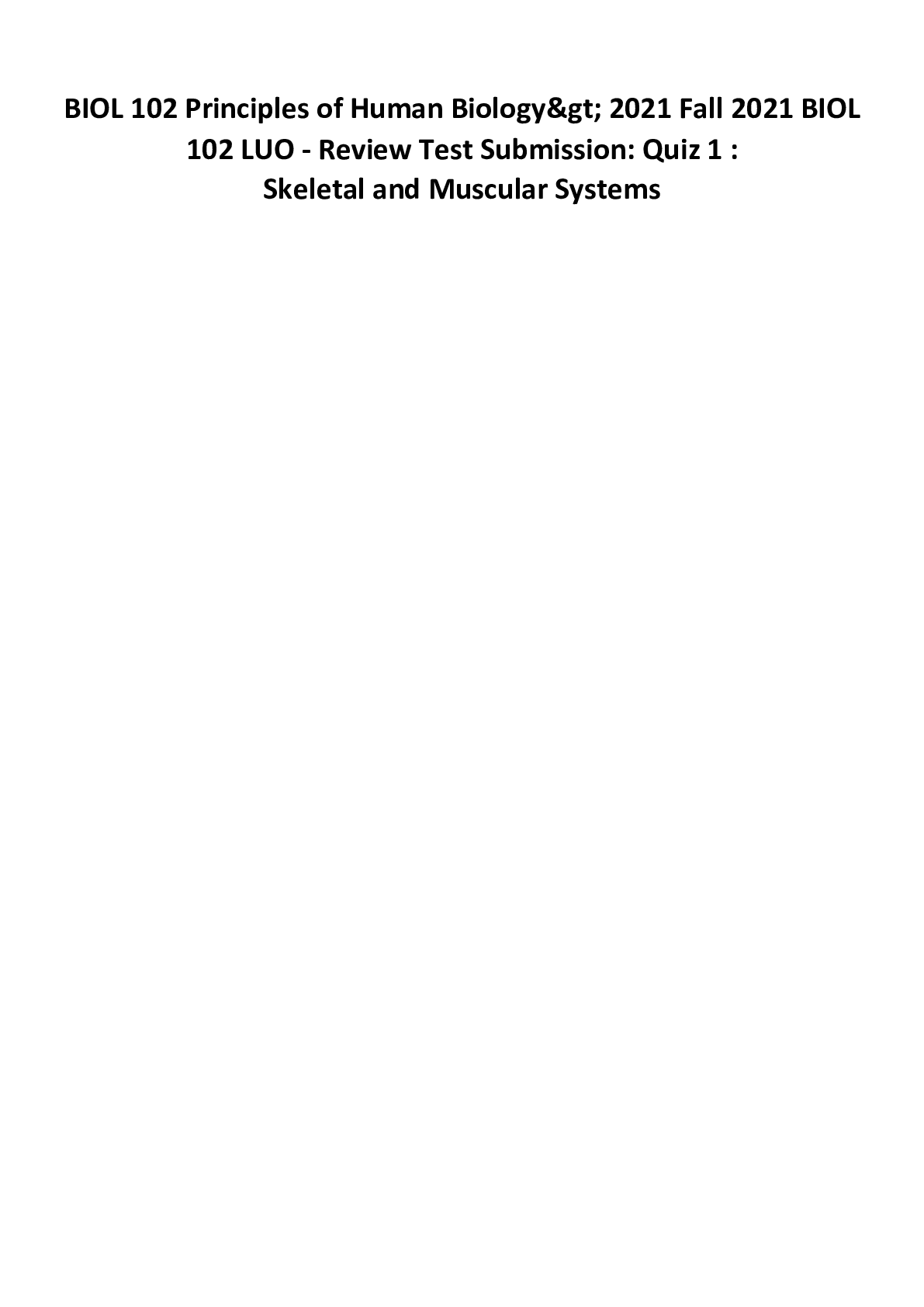
.png)
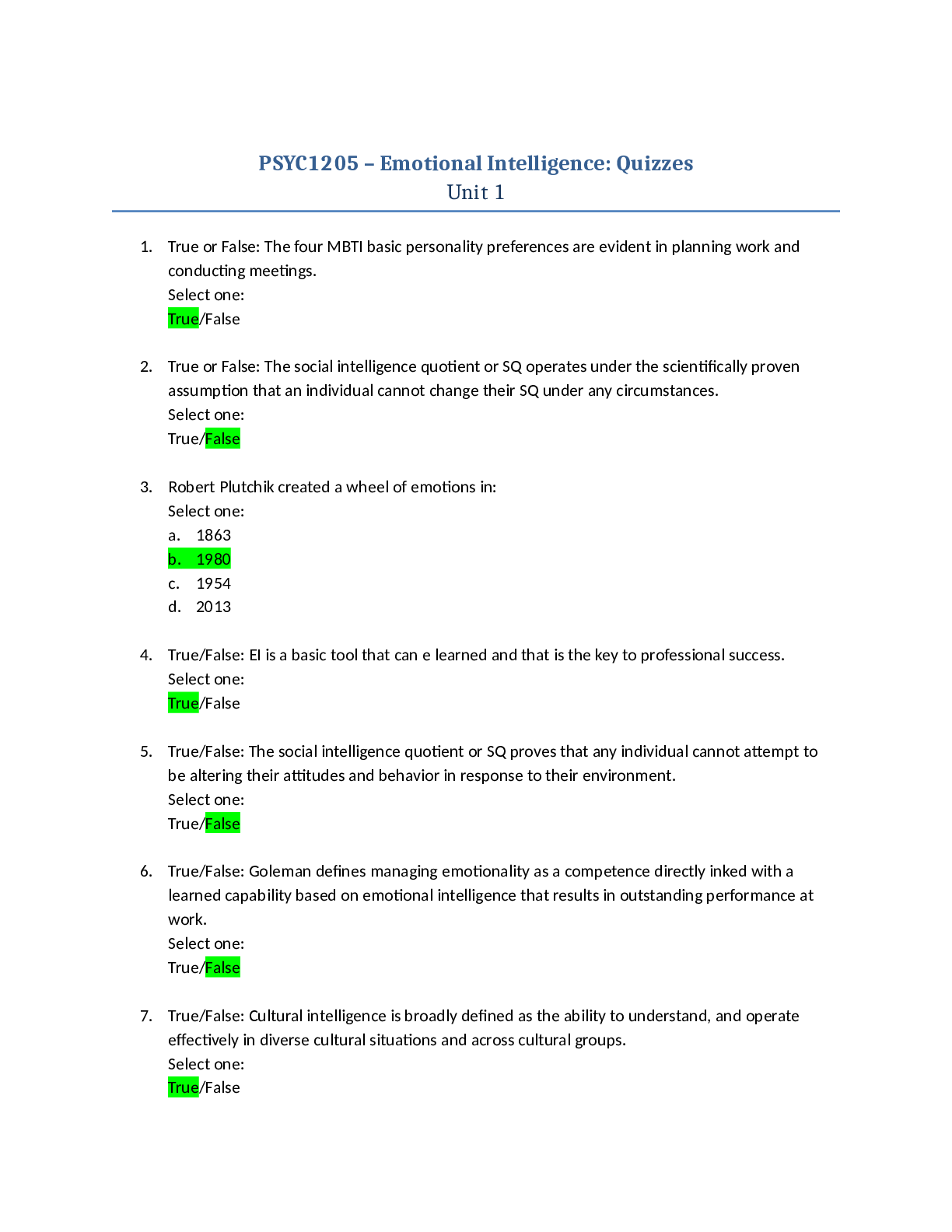
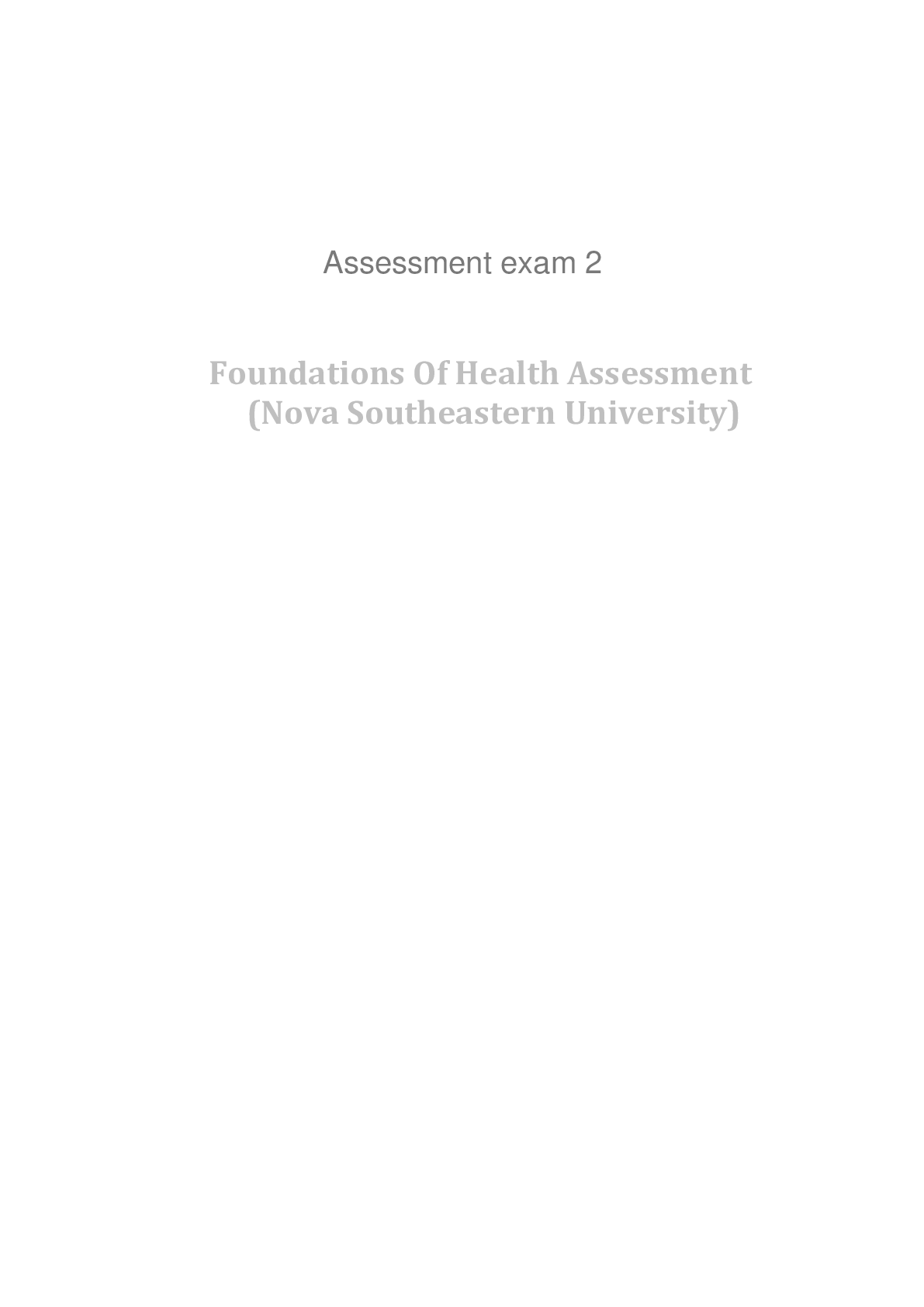
.png)
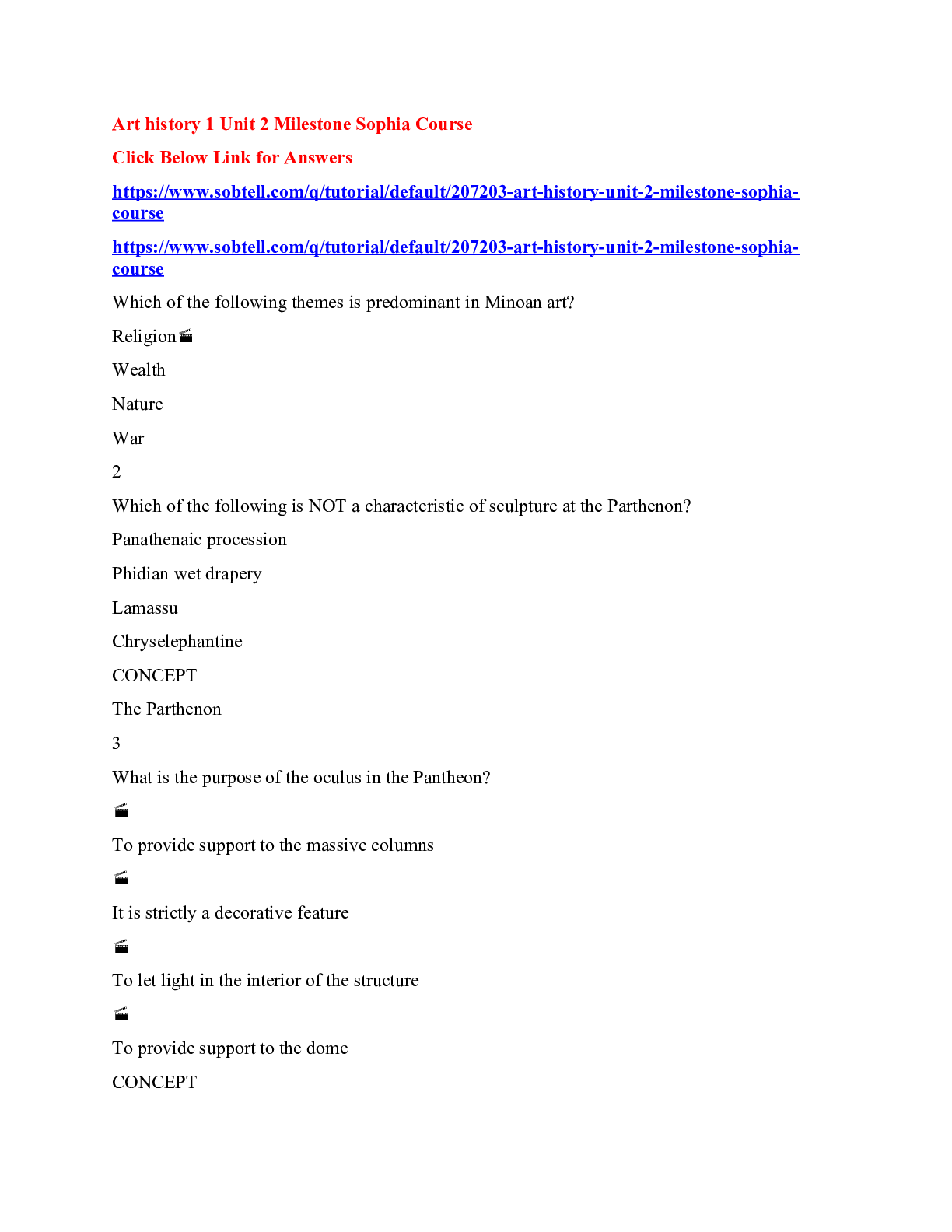
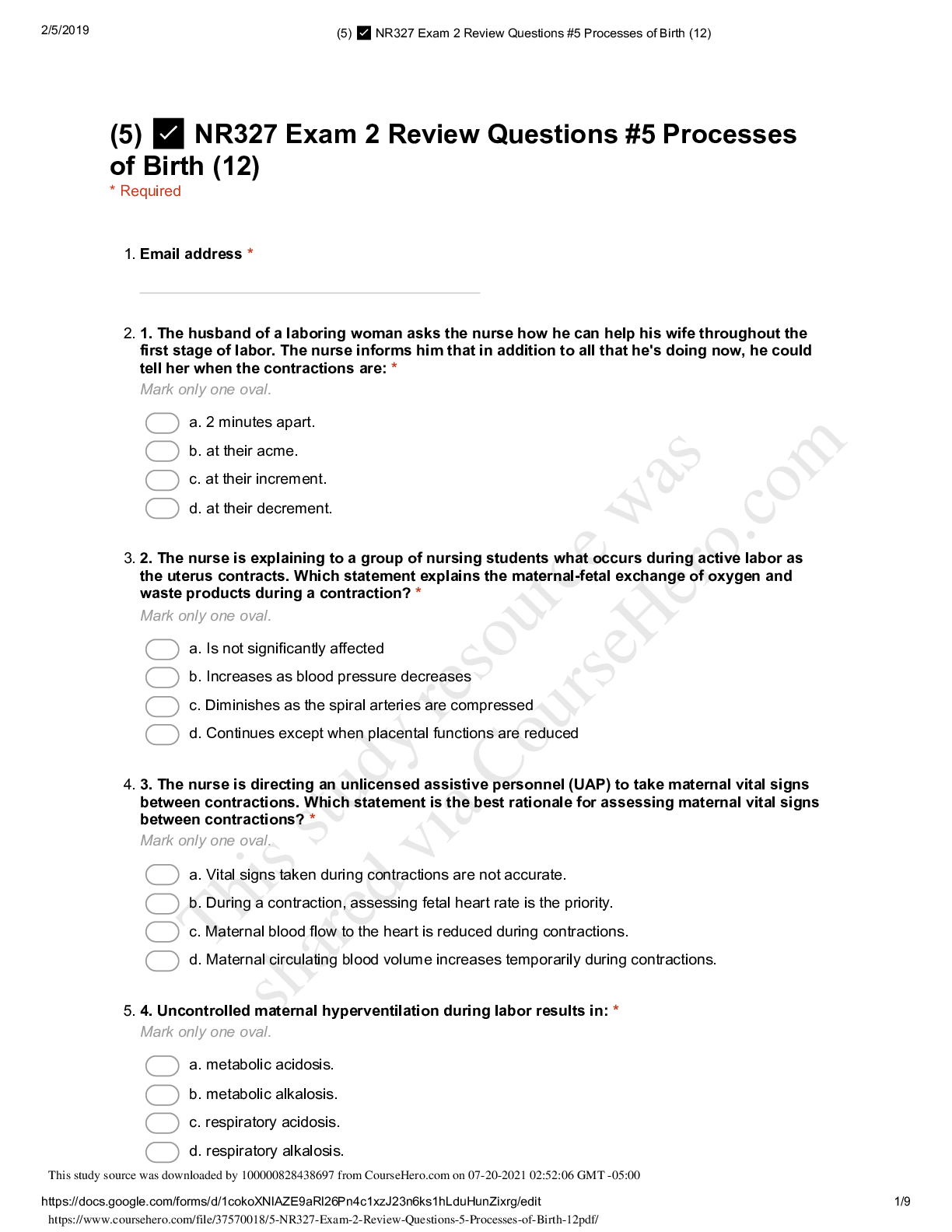

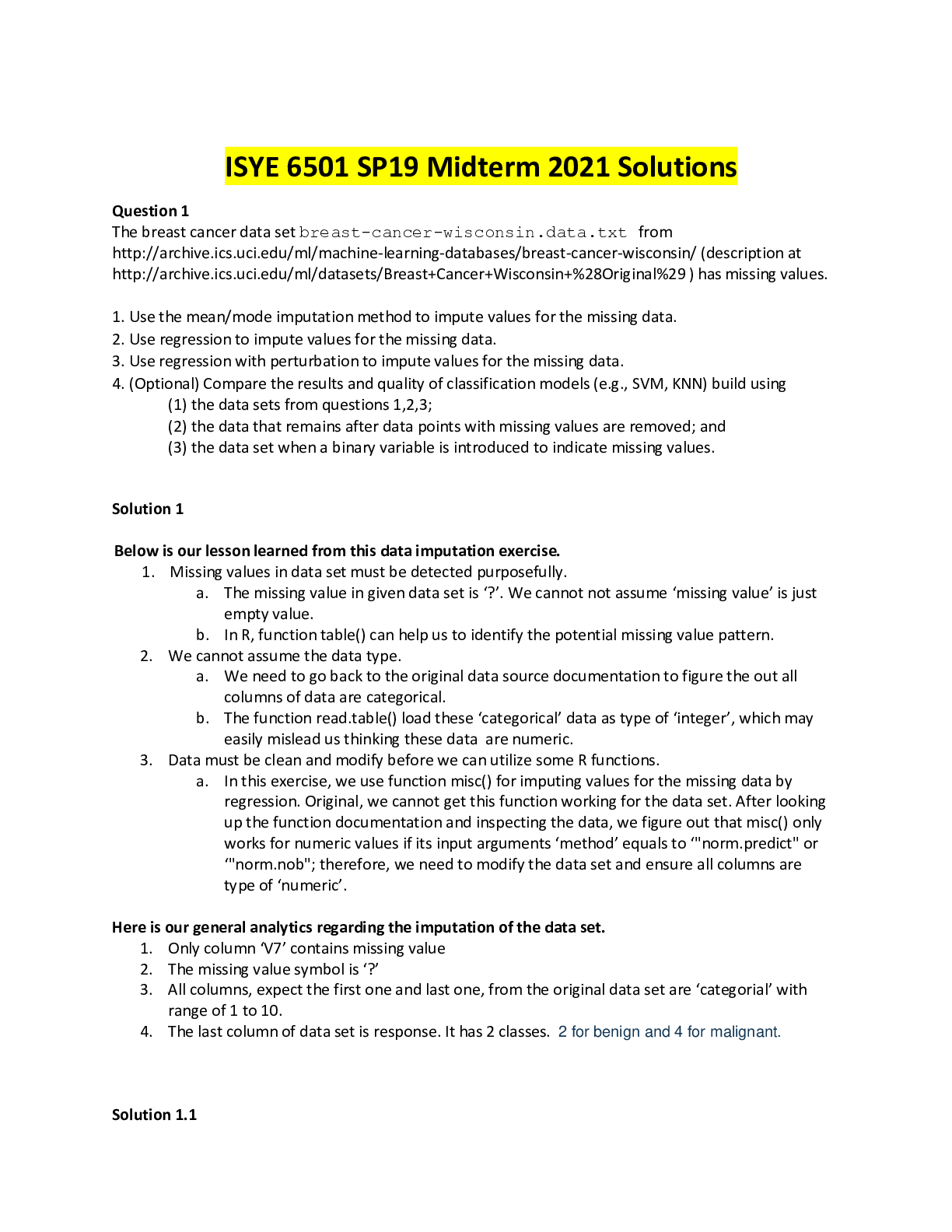
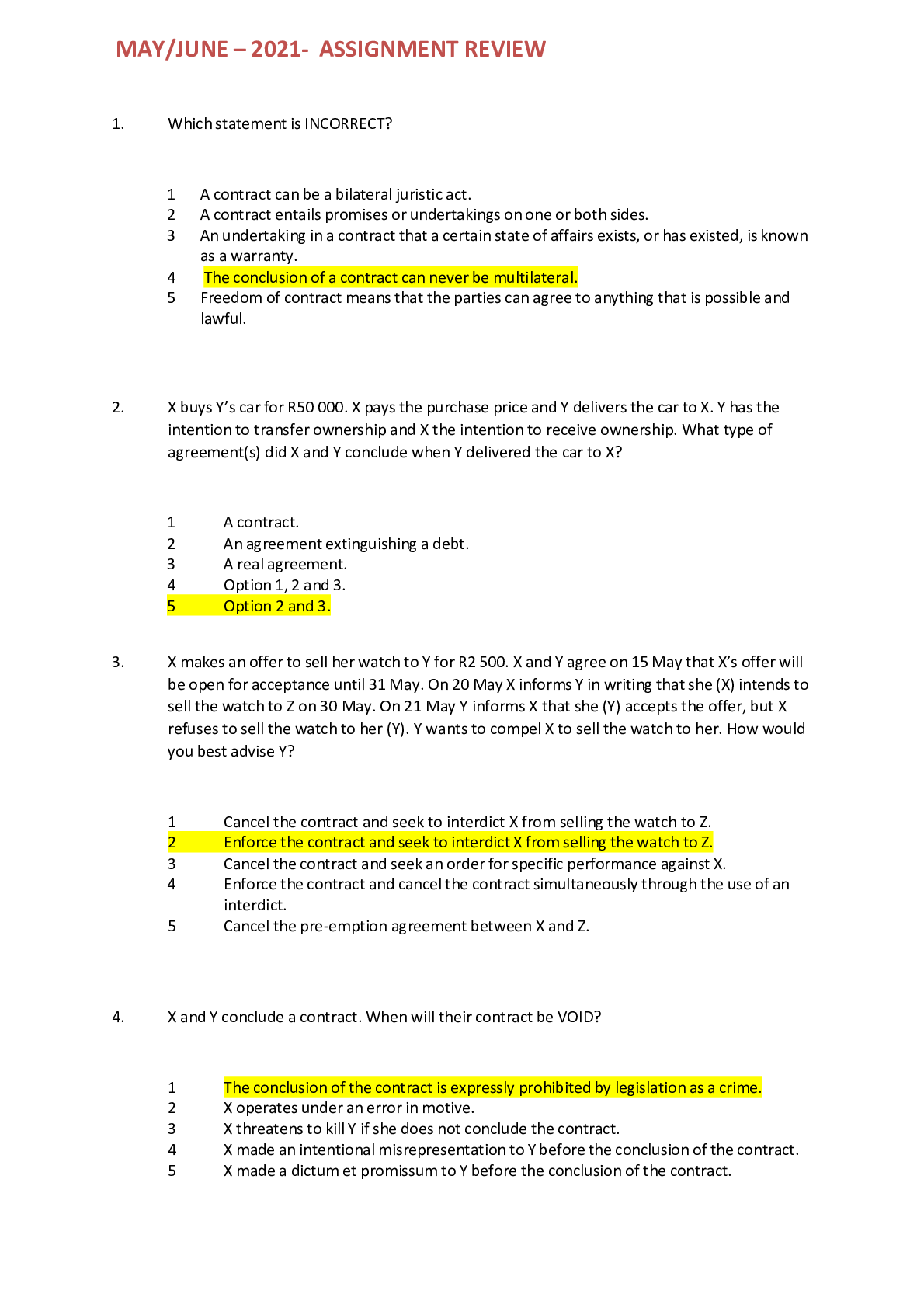
.png)
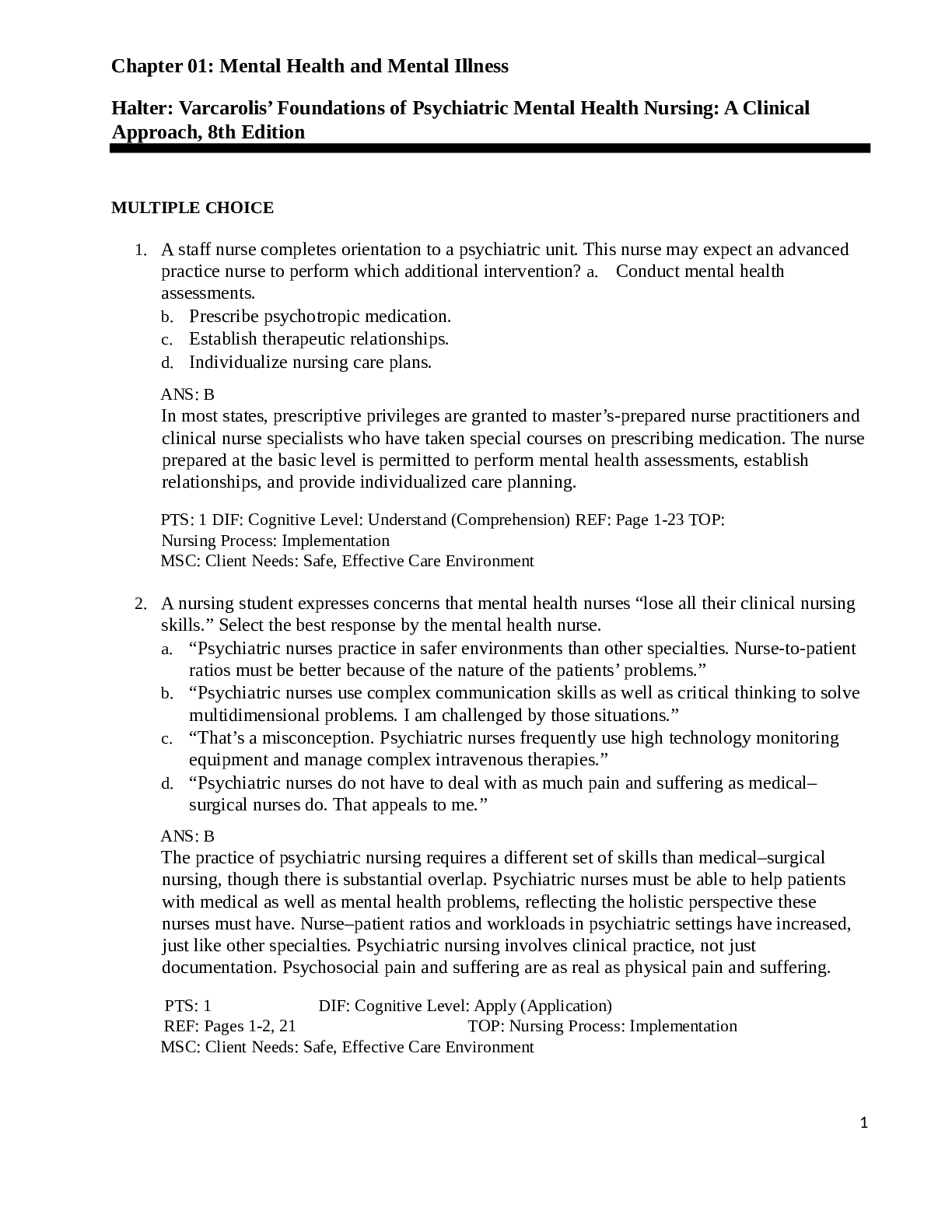
.png)
.png)
.png)
.png)
.png)
.png)
.png)
.png)
.png)
.png)
.png)

